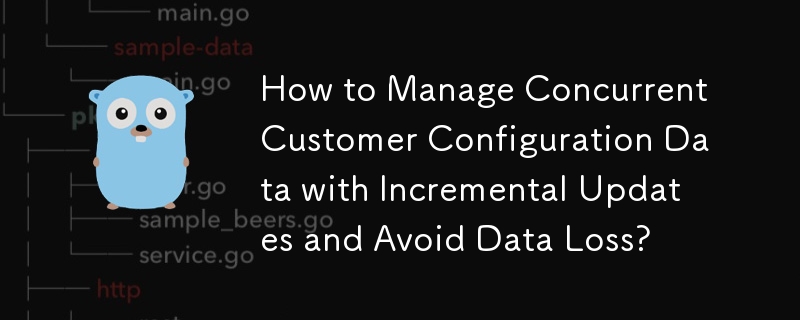如何通过增量更新管理并发客户配置数据并避免数据丢失?

从增量文件加载初始数据并处理更新
问题陈述
此代码管理一个存储客户配置数据的并发映射。在服务器启动期间,它将特定文件中的数据加载到地图中。它还监视新文件并使用这些文件中的数据更新地图,从而清除旧状态。
当读取方法遇到错误时就会出现此问题。在这种情况下,整个地图将被清除,即使应保留以前的配置数据,也将其保留为空。
解决方案
建议的解决方案简化了数据管理过程:
- 创建一个 CustomerConfig 结构体:这个结构体保存要缓存为“快照”的数据。
- 定义一个 loadConfig 函数:这个函数加载从所需的文件配置。
- 建立一个 ConfigCache 结构: 此缓存管理器存储当前配置并提供对其的访问。它确保安全的并发访问,并能够刷新缓存的配置。
- 实现refresher()函数:这个goroutine定期检查更改并在检测到时加载新配置。如果请求,它会尊重 closeCh 来停止。
- 实现 GetConfig() 方法:此方法提供对当前配置的只读访问。
实现详细信息
<code class="go">type CustomerConfig struct {
Data map[string]bool
// Add other properties if needed
LoadedAt time.Time
}
func loadConfig() (*CustomerConfig, error) {
cfg := &CustomerConfig{
Data: map[string]bool{},
LoadedAt: time.Now(),
}
// Implement the file loading logic here
// If an error occurs, return it
// If successful, return the config
return cfg, nil
}
type ConfigCache struct {
configMu sync.RWMutex
config *CustomerConfig
closeCh chan struct{}
}
func NewConfigCache() (*ConfigCache, error) {
cfg, err := loadConfig()
if err != nil {
return nil, fmt.Errorf("loading initial config failed: %w", err)
}
cc := &ConfigCache{
config: cfg,
closeCh: make(chan struct{}),
}
// Launch goroutine to refresh config
go cc.refresher()
return cc, nil
}
func (cc *ConfigCache) refresher() {
ticker := time.NewTicker(1 * time.Minute) // Every minute
defer ticker.Stop()
for {
select {
case <-ticker.C:
// Implement the logic to detect changes
changes := false
if !changes {
continue
}
cfg, err := loadConfig()
if err != nil {
log.Printf("Failed to load config: %v", err)
continue
}
cc.configMu.Lock()
cc.config = cfg
cc.configMu.Unlock()
case <-cc.closeCh:
return
}
}
}
func (cc *ConfigCache) Stop() {
close(cc.closeCh)
}
func (cc *ConfigCache) GetConfig() *CustomerConfig {
cc.configMu.RLock()
defer cc.configMu.RUnlock()
return cc.config
}</code>用法
<code class="go">// Initialize the cache
cc, err := NewConfigCache()
if err != nil {
// Handle the error
}
// Get the current configuration when needed
cfg := cc.GetConfig()
// Remember to stop the cache manager when appropriate
cc.Stop()</code>此解决方案可以防止丢失先前配置的问题,并简化配置更新的处理。
以上是如何通过增量更新管理并发客户配置数据并避免数据丢失?的详细内容。更多信息请关注PHP中文网其他相关文章!

热AI工具

Undresser.AI Undress
人工智能驱动的应用程序,用于创建逼真的裸体照片

AI Clothes Remover
用于从照片中去除衣服的在线人工智能工具。

Undress AI Tool
免费脱衣服图片

Clothoff.io
AI脱衣机

Video Face Swap
使用我们完全免费的人工智能换脸工具轻松在任何视频中换脸!

热门文章

热工具

记事本++7.3.1
好用且免费的代码编辑器

SublimeText3汉化版
中文版,非常好用

禅工作室 13.0.1
功能强大的PHP集成开发环境

Dreamweaver CS6
视觉化网页开发工具

SublimeText3 Mac版
神级代码编辑软件(SublimeText3)
 Debian OpenSSL有哪些漏洞
Apr 02, 2025 am 07:30 AM
Debian OpenSSL有哪些漏洞
Apr 02, 2025 am 07:30 AM
OpenSSL,作为广泛应用于安全通信的开源库,提供了加密算法、密钥和证书管理等功能。然而,其历史版本中存在一些已知安全漏洞,其中一些危害极大。本文将重点介绍Debian系统中OpenSSL的常见漏洞及应对措施。DebianOpenSSL已知漏洞:OpenSSL曾出现过多个严重漏洞,例如:心脏出血漏洞(CVE-2014-0160):该漏洞影响OpenSSL1.0.1至1.0.1f以及1.0.2至1.0.2beta版本。攻击者可利用此漏洞未经授权读取服务器上的敏感信息,包括加密密钥等。
 从前端转型后端开发,学习Java还是Golang更有前景?
Apr 02, 2025 am 09:12 AM
从前端转型后端开发,学习Java还是Golang更有前景?
Apr 02, 2025 am 09:12 AM
后端学习路径:从前端转型到后端的探索之旅作为一名从前端开发转型的后端初学者,你已经有了nodejs的基础,...
 Beego ORM中如何指定模型关联的数据库?
Apr 02, 2025 pm 03:54 PM
Beego ORM中如何指定模型关联的数据库?
Apr 02, 2025 pm 03:54 PM
在BeegoORM框架下,如何指定模型关联的数据库?许多Beego项目需要同时操作多个数据库。当使用Beego...
 GoLand中自定义结构体标签不显示怎么办?
Apr 02, 2025 pm 05:09 PM
GoLand中自定义结构体标签不显示怎么办?
Apr 02, 2025 pm 05:09 PM
GoLand中自定义结构体标签不显示怎么办?在使用GoLand进行Go语言开发时,很多开发者会遇到自定义结构体标签在�...
 Go语言中用于浮点数运算的库有哪些?
Apr 02, 2025 pm 02:06 PM
Go语言中用于浮点数运算的库有哪些?
Apr 02, 2025 pm 02:06 PM
Go语言中用于浮点数运算的库介绍在Go语言(也称为Golang)中,进行浮点数的加减乘除运算时,如何确保精度是�...
 Go的爬虫Colly中Queue线程的问题是什么?
Apr 02, 2025 pm 02:09 PM
Go的爬虫Colly中Queue线程的问题是什么?
Apr 02, 2025 pm 02:09 PM
Go爬虫Colly中的Queue线程问题探讨在使用Go语言的Colly爬虫库时,开发者常常会遇到关于线程和请求队列的问题。�...
 在Go语言中使用Redis Stream实现消息队列时,如何解决user_id类型转换问题?
Apr 02, 2025 pm 04:54 PM
在Go语言中使用Redis Stream实现消息队列时,如何解决user_id类型转换问题?
Apr 02, 2025 pm 04:54 PM
Go语言中使用RedisStream实现消息队列时类型转换问题在使用Go语言与Redis...
 如何在Debian上配置MongoDB自动扩容
Apr 02, 2025 am 07:36 AM
如何在Debian上配置MongoDB自动扩容
Apr 02, 2025 am 07:36 AM
本文介绍如何在Debian系统上配置MongoDB实现自动扩容,主要步骤包括MongoDB副本集的设置和磁盘空间监控。一、MongoDB安装首先,确保已在Debian系统上安装MongoDB。使用以下命令安装:sudoaptupdatesudoaptinstall-ymongodb-org二、配置MongoDB副本集MongoDB副本集确保高可用性和数据冗余,是实现自动扩容的基础。启动MongoDB服务:sudosystemctlstartmongodsudosys






